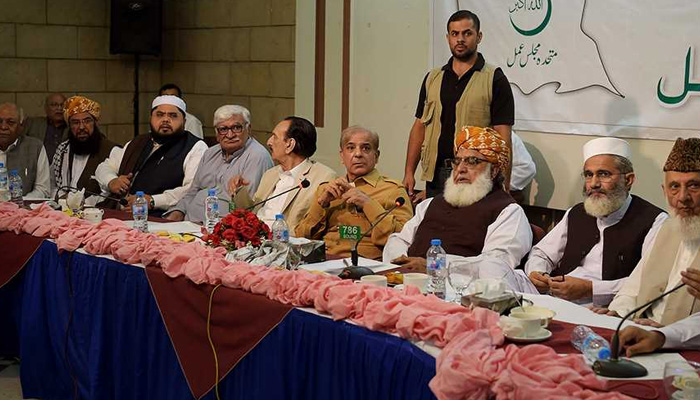Selection of candidates for some top slots test for opposition parties’ unity
At least seven top government and parliamentary positions are available to the combined opposition parties to pick up through consensus their joint candidates.
ISLAMABAD: At least seven top government and parliamentary positions are available to the combined opposition parties to pick up through consensus their joint candidates.
While taking decisions for these elections, the grouping will face the test whether or not it is united and can remain a cohesive and cogent fore. They will turn out to be a formidable power to be reckoned with if they act and speak with one voice. Any disunity among their ranks will certainly be to the advantage of the opposite side.
The opposition parties may be able to squeeze some of these offices, defeating the next ruling coalition’s representatives, if they work as a unified entity and follow the give and take principle in selecting their joint nominees.
Pakistan People’s Party (PPP) young leader Bilawal is aspiring for a couple of offices with his father Asif Ali Zardari wishing to launch his son in the parliamentary politics with a big bang. In the first go, the joint opposition force will field its contenders in the election of the National Assembly Speaker and Deputy Speaker, which will be held immediately after the swearing-in of the MPs elected in the July 25 polls. Obviously, most important will be the aspirants that it will jointly field for these slots.
This exercise will be followed by the election of the prime minister in which the opposition parties are bracing up to actively participate. Despite being number two party in terms of numerical strength after the Pakistan Muslim League-Nawaz (PML-N), Bilawal has announced that he will fight for this berth. However, it will be the decision of the joint opposition to select him or someone else to challenge Imran Khan. PML-N President Shahbaz Sharif has already made it known that his party will sit on the opposition benches.
As per the parliamentary tradition and norms, the largest party occupying the opposition benches nominates the leader of the opposition in all elected forums. In the instant case, it is the PML-N, which is the largest opposition party.
However, Bilawal has declared that he will vie for this position as well. He may be named for this office if there is a consensus among the opposition parties. The PML-N plans to give this slot to Khawaja M Asif while making Shahbaz Sharif as its parliamentary leader. If this plan is successful, Khawaja Asif will become a menacing leader of opposition. The PML-N needs such an aggressive articulate figure at this point of time.
After dealing with these nominations and elections in the National Assembly, the opposition grouping will decide about its candidates for the chairman and deputy chairman of the Senate. Chairman Sadiq Sanjrani’s days are numbered and he is going to be voted out sooner than later. The PPP already has its leader holding the post of the deputy chairman, who is unlikely to be shown the door.
After the controversial election of the incumbent Senate chief and his deputy in March this year, PPP stalwart Sherry Rehman became the leader of opposition, the first ever female to hold this position, in the Upper House of Parliament. At the time, the PML-N was in government. In the changed situation and in view of the new likely arrangement and distribution of senior offices among the opposition parties, she may not be able to hold this post.
For example, if, during consultations, it is agreed by the opposition parties that the PPP nominee be elected as the Senate chairman, it will be illogical to have Sherry Rehman as the opposition leader. In any case, the PTI being the next ruling party will get the position of the Leader of the House while the post of Opposition Leader will go to the other side.
The opposition parties will also choose their joint candidate for the grand election of the president of Pakistan to be held later this month. It is believed that the PML-N and PPP being the largest opposition parties will get the lion’s share as far as nomination of contestants for these key posts is concerned.
However, to keep unity in the combined opposition grouping, other components may also be accommodated as is generally done for the sake of consensus and accord.
-
 Harry Styles Opens Up About Isolation After One Direction Split
Harry Styles Opens Up About Isolation After One Direction Split -
 Shamed Andrew Was ‘face To Face’ With Epstein Files, Mocked For Lying
Shamed Andrew Was ‘face To Face’ With Epstein Files, Mocked For Lying -
 Kanye West Projected To Explode Music Charts With 'Bully' After He Apologized Over Antisemitism
Kanye West Projected To Explode Music Charts With 'Bully' After He Apologized Over Antisemitism -
 Leighton Meester Reflects On How Valentine’s Day Feels Like Now
Leighton Meester Reflects On How Valentine’s Day Feels Like Now -
 Sarah Ferguson ‘won’t Let Go Without A Fight’ After Royal Exile
Sarah Ferguson ‘won’t Let Go Without A Fight’ After Royal Exile -
 Adam Sandler Makes Brutal Confession: 'I Do Not Love Comedy First'
Adam Sandler Makes Brutal Confession: 'I Do Not Love Comedy First' -
 'Harry Potter' Star Rupert Grint Shares Where He Stands Politically
'Harry Potter' Star Rupert Grint Shares Where He Stands Politically -
 Drama Outside Nancy Guthrie's Home Unfolds Described As 'circus'
Drama Outside Nancy Guthrie's Home Unfolds Described As 'circus' -
 Marco Rubio Sends Message Of Unity To Europe
Marco Rubio Sends Message Of Unity To Europe -
 Savannah's Interview With Epstein Victim, Who Sued UK's Andrew, Surfaces Amid Guthrie Abduction
Savannah's Interview With Epstein Victim, Who Sued UK's Andrew, Surfaces Amid Guthrie Abduction -
 Piers Morgan Supports Bad Bunny As US Lawmakers Seek Action
Piers Morgan Supports Bad Bunny As US Lawmakers Seek Action -
 Jennifer Love Hewitt Reminisces About Workign With Betty White
Jennifer Love Hewitt Reminisces About Workign With Betty White -
 Hilarie Burton Reveals Valentine's Day Plans With Jeffrey Dean Morgan
Hilarie Burton Reveals Valentine's Day Plans With Jeffrey Dean Morgan -
 Harry Styles Silently Deleted Instagram App
Harry Styles Silently Deleted Instagram App -
 Cardi B Compares Her Fall To Government At Las Vegas Show
Cardi B Compares Her Fall To Government At Las Vegas Show -
 Harry Styles Reveals Biggest Lesson Learnt During Music Hiatus
Harry Styles Reveals Biggest Lesson Learnt During Music Hiatus




